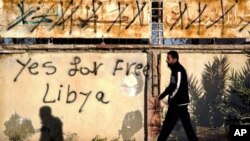An Arab League conference in Cairo has examined how to put a stop to the conflict in Libya, bring about a political dialogue and resolve the country’s humanitarian crisis.
The meeting was one of a series of diplomatic initiatives to find a solution for Libya. It coincided with a NATO conference in Berlin Thursday, and followed an international gathering in Qatar Wednesday and an African Union mission to Libya earlier this week.
U.N. Secretary-General Ban Ki-moon told the Cairo gathering that the international community is seeking to empower the Libyan people and improve their future.
"We call for a political process through which the Libyan people can choose their own future. That process should also meet the legitimate demands and aspirations of the Libyan people [including] democracy, freedom and rule of law and socio-economic development. The world must not waver. The Libyan people deserve no less," Ban said.
The secretary-general said he will send his special representative, former Jordanian Foreign Minister Abdel Ilah Khatib back to Libya to meet with both sides. He said the U.N. is hoping to ease the tragic conditions of all victims of the conflict.
Arab League Secretary-General Amr Moussa concurred that Arab states are extremely worried about the deplorable conditions in parts of Libya and the plight of Libyan civilians. The Arab League, he pointed out, agreed to U.N. Security Council resolutions calling for a no-fly zone in order to protect the Libyan people.
Moussa says that diplomatic efforts are now focusing on achieving a cease-fire in Libya, and that this was the top provision of the African Union peace proposal or "roadmap”.
He says that a political solution in Libya begins with a cease-fire, in accordance with U.N. Security Council resolutions, as well as diplomatic initiatives by the African Union and Turkey. He adds that this position is agreed upon and supported by the European Union, the African Union, the Organization of the Islamic Conference, the Arab League and the United Nations.
European Union foreign policy head Catherine Ashton repeated Amr Moussa’s insistence on a cease-fire, underscoring that there can be no military solution to the conflict in Libya:
"More than anything, the first priority must be a cease-fire, the protection of citizens and clearing the way for humanitarian assistance. The only solutions in the end to this crisis are political. We believe that the regime has lost all legitimacy and it should leave power and allow the Libyan people to determine their own future through a process of dialogue between different sides, different parts of Libyan society, and that that dialogue should lead to democratic transition, led by the Libyan people, respecting the territorial integrity of the country," she said.
Ashton applauded the close international cooperation over the crisis in Libya and insisted that it was fundamental in finding a solution. She also stressed that the European Union is ready to "conduct a humanitarian operation" to help the Libyan people, if asked to do so by the U.N.
Arab League Debates Options in Libya




